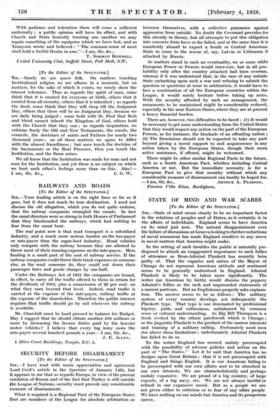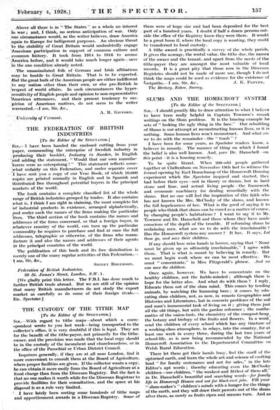STATE OF MIND AND WAR SCARES
[To the Editor of the SPECTATOR.] Sin,—State of mind seems clearly to be an important factor in the relations of peoples and of States, as it certainly is in the affairs of individuals. England seems to have America on its mind just now. The natural disappointment over the failure of discussions at Geneva looking to further reductions of naval armament has made England sensitive to any move in naval matters that America might make.
• In the setting of such troubles the public is naturally pre- disposed to attach an exaggerated importance to such follies of utterance as Rear-Admiral Plunkett has recently been guilty of. That the vagaries and antics of the Mayor of Chicago do not represent American attitude and sentiment seems to be generally understood in England. Admiral Plunkett is likely to be taken more significantly. The writer (an American by birth) would dismiss the peppery Admiral's follies as the rash and ungrounded statements of a narrow partisan. But an Englishman properly asks explana- tion. The answer seems to be as follows-: The military system of every country develops not infrequently the Plunkett type. That type is one dominated by professional bigotry, pride, and enthusiasm, unbalanced by common sense or cultural understanding. As Big Bill Thompson is a freak evoked by the ethnic patchwork which is Chicago ; so the jingoistic Plunkett is the product of the narrow interests and training of a military calling. Fortunately most men rise Above these limitations ; unfortunately Admiral Plunkett
has failed to do so. -
To the writer England has seethed unduly preoccupied with the possibility of adverse polibies and action on the part of " The States." Let it he said that Ainerica has no designs upon Great Britain ; that it is not preoccupied with England and things English. It is our American failing to be preoccupied with our own affairs and to be absorbed in our own interests. We are characteristically and perhaps unduly expansive. We- are proud of a big country, of 'large exports, of a big navy, etc. We are not always tactful or refined in our expansive mood: But as a people we are not given either to criticism or to fear of any other people We have nothing on our minds but America and its prosperous
career. .
Above all theye is in The States " as a whole no interest in war ; and,. I think, no serious anticipation of. war. Only one, circumstance would, as the writer believes, draw America again to Europe for belligerent purposes. An obvious threat
• to the stability of Great Britain would undoubtedly engage 'American participation in support of common culture and common history. It took from 1914 to 1916 to arouse America before, and it would take much longer again=save in the one condition already noted.
.The unassimilated folk of German and Irish affiliations may be hostile to Great Britain. That is to be expected. But the great bulk of the American people are either indifferent to any nation other than their own, or else pm-British in :respect of world affairs. In such circumstances the hyper- sensitivity of English people and opinion to non-representative hmerican utterances, and their present tendency to sus- , Ipicion of American motives, do not seem to the writer warranted.—I am, Sir, &e.,







































 Previous page
Previous page